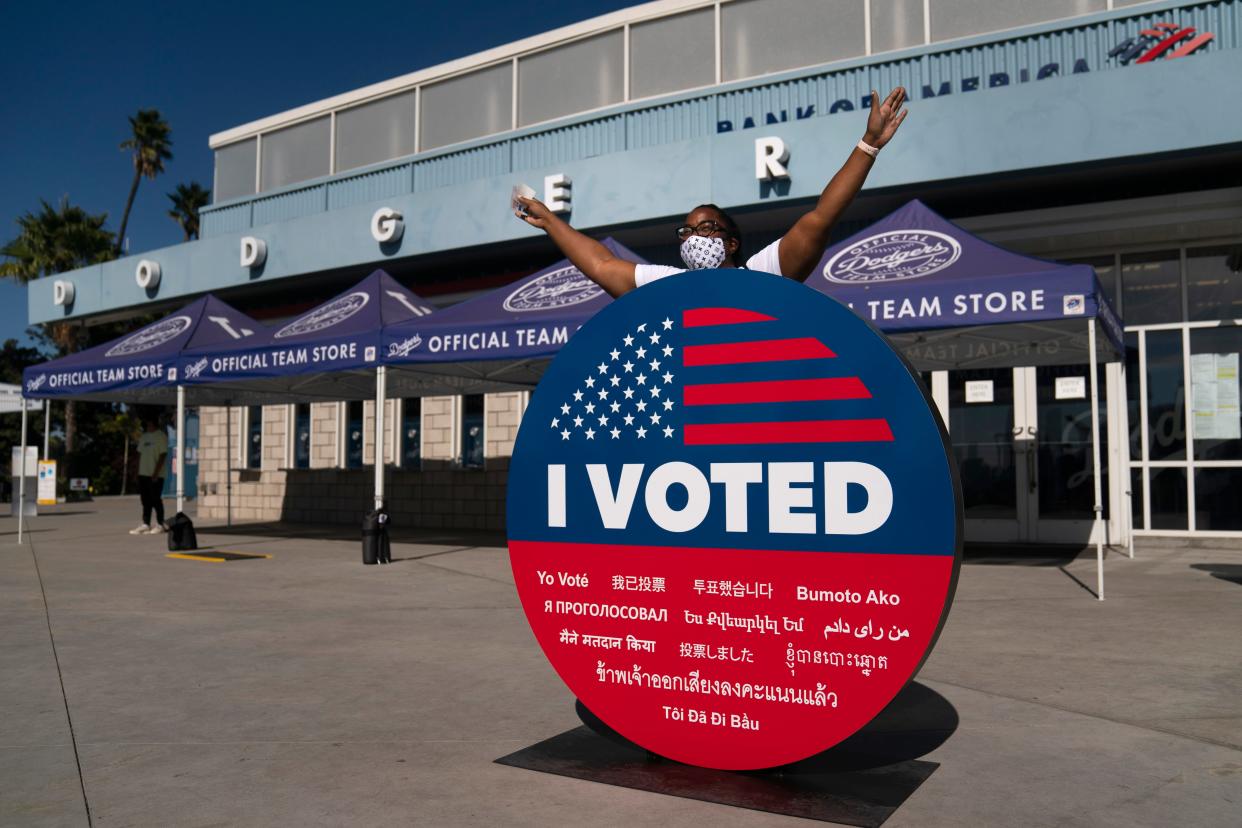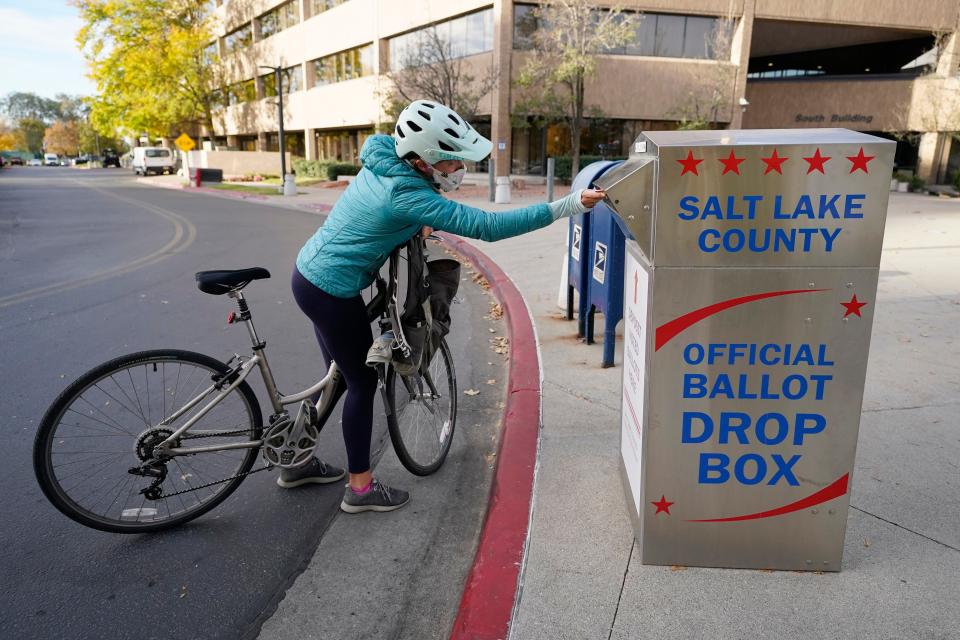It's crazy that we have to launch Republicans for Voting Rights. This is Trump's doing.

- Oops!Something went wrong.Please try again later.
All Americans who meet the proper legal requirements have the right to vote. And when they do, their votes should be counted. Sounds pretty basic, right?
Such proclamations shouldn’t be controversial, yet there are many efforts underway to make it harder for Americans to vote and easier for politicians to disregard the will of the people – and the Supreme Court's decision last week to uphold years-old Arizona voting restrictions will embolden those efforts.
This cannot stand, which is why we’ve started Republicans for Voting Rights. Because we believe in making good on the fundamental promise of democracy, which guarantees: We choose our leaders. Politicians and bureaucrats don’t choose for us.
As former staffers to prominent Republicans, we are clear-eyed about threats. This isn’t a “both sides” issue. We are in this sad predicament because former President Donald Trump and his allies cast ridiculous, unfounded aspersions on our election systems for no other reason than their disappointment with the election results.
Violence, suppression are un-American
We all witnessed on Jan. 6 what happened when they took their lies and conspiracies too far – the first nonpeaceful transition of power in the history of our great nation. Shamefully, many Republican state legislators are advocating new voting restrictions based on the same lies that caused so much damage that day.
Political violence and voter suppression should never be part of the American way.
Despite unprecedented challenges posed by COVID-19, states expanded effective and secure options to vote, including early, mail-in and drive-through options, as well as drop-off boxes, in addition to traditional voting on Election Day. As a result, more than 158 million Americans voted, shattering turnout records. Two out of three eligible Americans cast a ballot – the highest turnout rate since 1900.

Despite the challenges of the pandemic and the expanded voting methods, security officials called the 2020 election “the most secure in American history.” The Justice Department reported no evidence of widespread voter fraud – none. However, in the wake of Trump’s loss, the former president and many of his Republican allies have concluded voting access measures contributed to Trump’s loss, and thus should be nixed.
In May, Florida Gov. Ron DeSantis signed a new law limiting access to ballot drop boxes and imposing $25,000 fines on election officials who fail to comply. Other states such as Texas are pursuing restrictions that would limit the window for early voting and make voting by mail more difficult. These bills and others like them are based on spurious claims of widespread voter fraud, which somehow prevented Trump’s reelection yet helped down-ballot Republicans achieve surprising victories.
Other states are exploring ways to criminalize minor violations of complicated elections laws by election officials (one Texas proposal would send them to jail for accidentally giving a ballot application, not a ballot, to someone who didn’t request one), and make it easier for partisan poll watchers to monitor voters in close physical proximity, increasing the likelihood of intimidation and harassment.
Donna Brazile: Republicans crush voting rights, making a mockery of their support for Juneteenth
Georgia Republicans passed a law to allow the GOP-led legislature to suspend county election officials and remove the secretary of state from the state election board – clearly retribution for current Republican Secretary of State Brad Raffensperger’s refusal to carry out Trump’s appeals to "find" enough votes to change the election result in the state.
Similarly, Arizona Republicans stripped their Democratic secretary of state of her authority to conduct election lawsuits, giving that power to the Republican attorney general instead. Meanwhile, the state remains consumed with a conspiracy-theory driven investigation of the election results in Maricopa County that Republican election officials called a “circus” that “weakens our democratic republic.”
Expanded access helps Republicans
But there is good news. In Kentucky, the Republican-controlled legislature and the Democratic governor reached a landmark agreement in April to make last year’s expansions of voting access permanent. And, for those keeping score at home, Kentucky Republicans did just fine: They held all the U.S. House and Senate seats they controlled before the 2020 election while adding two seats in the Kentucky Senate and 13 in the Kentucky House.
There could hardly be better proof that increasing voting access isn’t a threat to Republicans.
Rep. Val Demings: Voters didn't elect us to do nothing and blame the Senate filibuster. Get rid of it.
On the federal level, though the For the People Act exceeded what most Republicans could support, the guidelines recently proposed by Sen. Joe Manchin, D-W.Va., are a much better starting place for a compromise. Establishing a national, automatic system for voter registration, standards for voter identification, and ways to deliver mail-in ballots to all registered voters are all wonderful ideas.
Congress should also amend the Electoral Count Act to raise the requirement beyond one representative and one senator to object to counting a state’s electoral votes. Even if this provision hadn’t served as a spark for violence on Jan. 6, it should take more than two members of Congress to contest the votes of millions of Americans.
These are the types of reforms Republicans can champion. Together, we can restore the promise of America by rallying around the sacred, central blessing of our democracy: voting rights.
Amanda Carpenter (@amandacarpenter) is a CNN contributor, a political columnist for The Bulwark and a former communications aide to Texas Sen. Ted Cruz and former Sen. Jim DeMint of South Carolina. Olivia Troye (@OliviaTroye) is director of the Republican Accountability Project, a former intelligence officer and a former homeland security and counterterrorism adviser to former Vice President Mike Pence. Both are directors of Republicans for Voting Rights.
You can read diverse opinions from our Board of Contributors and other writers on the Opinion front page, on Twitter @usatodayopinion and in our daily Opinion newsletter. To respond to a column, submit a comment to letters@usatoday.com.
This article originally appeared on USA TODAY: Trump and Republicans should champion voting rights, not restrictions

